广东省高三上学期英语教学设计第9周:unit 1 women of achievement
- 格式:doc
- 大小:40.50 KB
- 文档页数:3
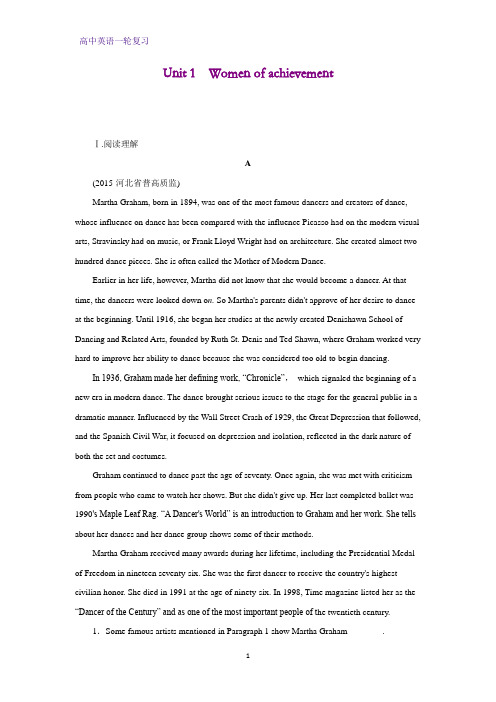
Unit 1 Women of achievementⅠ.阅读理解A(2015·河北省普高质监)Martha Graham, born in 1894, was one of the most famous dancers and creators of dance, whose influence on dance has been compared with the influence Picasso had on the modern visual arts, Stravinsky had on music, or Frank Lloyd Wright had on architecture. She created almost two hundred dance pieces. She is often called the Mother of Modern Dance.Earlier in her life, however, Martha did not know that she would become a dancer. At that time, the dancers were looked down o n. So Martha's parents didn't approve of her desire to dance at the beginning. Until 1916, she began her studies at the newly created Denishawn School of Dancing and Related Arts, founded by Ruth St. Denis and Ted Shawn, where Graham worked very hard to improve her ability to dance because she was considered too old to begin dancing.In 1936, Graham made her defining work, “Chronicle”,which signaled the beginning of a new era in modern dance. The dance brought serious issues to the stage for the general public in a dramatic manner. Influenced by the Wall Street Crash of 1929, the Great Depression that followed, and the Spanish Civil War, it focused on depression and isolation, reflected in the dark nature of both the set and costumes.Graham continued to dance past the age of seventy. Once again, she was met with criticism from people who came to watch her shows. But she didn't give up. Her last completed ballet was 1990's Maple Leaf Rag. “A Dancer's World” is an introduction to Graham and her work. She tells about her dances and her dance group shows some of their methods.Martha Graham received many awards during her lifetime, including the Presidential Medal of Freedom in nineteen seventy-six. She was the first dancer to receive the country's highest civilian honor. She died in 1991 at the age of ninety-six. In 1998, Time magazine listed her as the “Dancer of the Century” and as one of the most important people of t he twentieth century.1.Some famous artists mentioned in Paragraph 1 show Martha Graham________.A.was influenced greatly by themB.kept in touch with them regularlyC.had a great effect on modern danceD.liked to make more friends with them2.Why didn't Martha's parents approve of her desire to dance at first?A.She was too old to learn American dance.B.American dance was seen as a lower art form.C.There was no academic school to teach dancing.D.Her family was too poor to afford her tuition.3.When Martha Graham continued to dance in her 70s, she________.A.was warmly welcomed by the youthB.achieved huge success once againC.received many awards for her ageD.was attacked by people4.The text is mainly about________.A.the background of modern dance in AmericaB.the development of modern dance in AmericaC.Martha Graham and her achievements in danceD.the awards Martha Graham won in her lifeB(2015·长春二模)Onthefirstdayofschoolourprofessorintroducedhimselfandchallengedustogettoknowsomeonew edidn'tknow.Ilookedroundwhenagentlehandtouchedmyshoulder.Iturnedaroundtofindawrinkled,littl eoldladywithasmile.Shesaid,“Hi,handsome.MynameisRose.I'meighty-sevenyearsold.CanIgiveyouahug?”Ilaughedandenthusiasticallyresponded,“Ofcourseyoumay!”Shegavemeagiantsqueeze.“Whyareyouincollegeatsuchayoung,innocentage?”Iasked.“IalwaysdreamedofhavingacollegeeducationandnowI'mgettingone!”shetoldme.AfterclasswewalkedtotheStudentUnionbuildingandsharedachocolatemilkshake.Webeca meinstantfriends.Every day of the next three months we would leave class together and talk nonstop. I was always listening to this “time machine” as she shared her wisdom and experience with me. Over the course of the year, Rose became a campus icon(偶像) and she easily made friends wherever she went. At the end of the semester we invited Rose to speak at our football dinner, I'll never forget what she taught us. “We do not stop playing because we are old; we grow old because we stop playing. There is a huge difference between growing older and growing up. Anybody can grow older. That doesn't take any talent or ability. The idea is to grow up by always finding opportunities in change. Have no regrets. The elderly usually don't have regrets for what we did, but rather for things we did not do. The only people who fear death are those with regrets.” She concluded her speech by courageously singing “The Rose”. She challenged each of us to study the lyrics (歌词) and live them out in our daily life. At the year's end she finished the college degree she had begun all those years. One week after graduation Rose died peacefully in her sleep.5.What happened to the author on the first day of school?A.He got to know an old professor.B.He made the acquaintance of an old lady.C.He joined the Student Union.D.He had to share a milkshake with others.6.From the underlined sentence in Paragraph 1, we can find out the author's ________.A. concern about ageB. respect for the oldC. curiosity about the ladyD. complaint about education7.In the author's eyes, ________.A.Rose was innocent and generousB.Rose was wise and skilledC.Rose was talented and hardworkingD.Rose was courageous and her words were inspiring8.Which saying might Rose possibly support?A.One is never too old to learn.B.A friend in need is a friend indeed.C.Rome wasn't built in a day.D.It is no use crying over spilt milk.Ⅱ.语法填空阅读下面材料,在空白处填入适当的内容(1个单词)或括号内单词的正确形式。
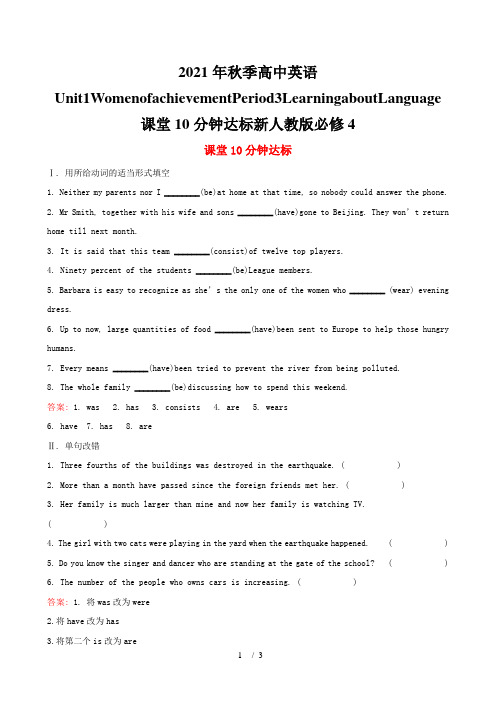
2021年秋季高中英语Unit1WomenofachievementPeriod3LearningaboutLanguage课堂10分钟达标新人教版必修4课堂10分钟达标Ⅰ. 用所给动词的适当形式填空1. Neither my parents nor I ________(be)at home at that time, so nobody could answer the phone.2. Mr Smith, together with his wife and sons ________(ha ve)gone to Beijing. They won’t return home till next month.3. It is said that this team ________(consist)of twelve top players.4. Ninety percent of the students ________(be)League members.5. Barbara is easy to recognize as she’s the only one of the w omen who ________ (wear) evening dress.6. Up to now, large quantities of food ________(have)been sent to Europe to help those hungry humans.7. Every means ________(have)been tried to prevent the river from being polluted.8. The whole family ________(be)discussing how to spend this weekend.答案: 1. was 2. has 3. consists 4. are 5. wears6. have7. has8. areⅡ. 单句改错1. Three fourths of the buildings was destroyed in the earthquake. ( )2. More than a month have passed since the foreign friends met her. ( )3. Her family is much larger than mine and now her family is watching TV.( )4. The girl with two cats were playing in the yard when the earthquake happened. ( )5. Do you know the singer and dancer who are standing at the gate of the school? ( )6. The number of the people who owns cars is increasing. ( )答案: 1. 将was改为were2.将have改为has3.将第二个is改为are4.将were改为was5.将are改为is6.将owns改为ownⅠ. 选词填空1. The boss, together with his workers, ________having a meeting now. (is/are)2. A large quantity of people ________our help. (need/needs)3. 70 percent of the farmers ________improved their living conditions. (have/has)4. Every man and every woman ________at work. (is/are)5. Many a student ________pop music. (enjoys/enjoy)6. A number of students in our class ________seen the film. (has/have)7. Reading English newspapers and magazines ________helpful to our study of English. (is/are)8. Either the girl or the boy ________from Canada. (is/are)9. Our class ________playing football on the playground. (is/are)10. When the lights went out, the family ________having supper together. (was/were)答案: 1. is 2. needs 3. have 4. is 5. enjoys 6. have7. is 8. is 9. are 10. wereⅡ. 语法填空阅读下面材料, 在空白处填入适当的内容(1个单词)或括号内单词的正确形式。
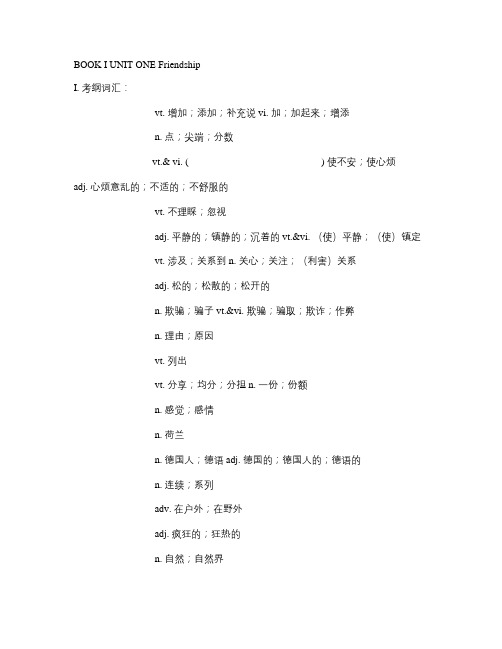
BOOK I UNIT ONE FriendshipI. 考纲词汇:________________ vt. 增加;添加;补充说 vi. 加;加起来;增添________________ n. 点;尖端;分数________________vt.& vi. (________ _________ _________) 使不安;使心烦adj. 心烦意乱的;不适的;不舒服的________________ vt. 不理睬;忽视________________ adj. 平静的;镇静的;沉着的 vt.&vi. (使)平静;(使)镇定________________ vt. 涉及;关系到 n. 关心;关注;(利害)关系________________ adj. 松的;松散的;松开的________________ n. 欺骗;骗子 vt.&vi. 欺骗;骗取;欺诈;作弊________________ n. 理由;原因________________ vt. 列出________________ vt. 分享;均分;分担 n. 一份;份额________________ n. 感觉;感情________________ n. 荷兰________________ n. 德国人;德语 adj. 德国的;德国人的;德语的________________ n. 连续;系列________________ adv. 在户外;在野外________________ adj. 疯狂的;狂热的________________ n. 自然;自然界________________ n. 目的;意图________________ vt. &v. aux 敢;胆敢________________ n. 雷;雷声; vi. 打雷;雷鸣________________ adv. 完全地;全然地;整个地________________ n. 能力;力量;权力________________ adv. 依照________________ adv. 按照;依据________________ vt. & n. 信任;信赖________________ adv. 在室内;入室内________________ vt.& vi. 遭受;忍受;经历________________ n. 十几岁的青少年________________ n. 忠告;建议________________ n. 调查表;问卷________________ n. 测验;提问 vt. 对……进行测验________________ n. 情形;境遇;(建筑物等的)位置________________ n. 编辑________________ vi. 交际;沟通;传达(感情、信息等)________________ n. 习惯;习性________________合计 ________________ 平静下来;镇定下来________________不得不;必须 ________________ 关心;挂念________________遛狗 ________________ 经历;经受________________躲藏;隐藏 ________________ 放下;记下;登记________________一连串的;一系列;一套 ________________ 故意________________为了… ________________ 面对面地________________按照;根据……所说 ________________ 与……相处;进展________________相爱;爱上 ________________ 参加;加入Ⅱ课文再现1. Add up (增加)your score and see how many points you can get. (P1)2. Your friend comes to school very upset. The bell rings so you need to go to class. You will ignore the bell and go somewhere quiet to calm your friend down.(使某人平静下来). / tell your friend that you’ve got to (不得不) go to class. / tell your friend that you are concerned about (关心,挂念) him/her but you have to go to class. You two will meet after class and talk then. (P1)3. Your friend has gone on holiday (度假) and asked you to take care of (照顾)his/her dog. While walking the dog (遛狗), you were careless and it got loose and was hit by a car. (P1)4. Or are you afraid that your friend would laugh at (嘲笑) you, or just can’t understand what you are going through? (经历) (P2)5. She and her family hid away (躲藏) for nearly twenty-five months before they were discovered. (P2)6. I don’t want to settle down (写下) a series of (一系列)facts in a diary as most people do, but I want this diary itself to be my friend, and I shall call my friend Kitty.(P2)7. For example, when it was so warm, I stayed awake on purpose (故意) until half past eleven one evening in order to (目的是)have a good look at the moon for once by myself. (P2)8. Another time five months ago, I happened to (碰巧) be upstairs one evening when the window was open…. It was the first time in a year and a half that I’d seen the night face to face…(面对面) (P2)9. He used to work (过去常做某事) outdoors even in the middle of winter. (P4)10. I’ m getting along well with (与某人相处友好)a boy in my class.(P6)11. Join in (加入) people’s discussion. Try to make friends with(与某人交朋友) one or two classmates. (P7)12. Mr. Jones lives alone (单独) and often feels lonely.(孤独) We communicate with each other (相互交流)by Internet /through the Internet.(P42)13. A friend in need is a friend indeed. (患难之交才是真正的朋友) (P46)14. A friend to all is a friend to none. (滥交者无友) (P46)15. With clothes the new are the best; with friends the old are the best. (衣服是新的好;朋友是旧的好) (P46)III. 单词:1、survey n. 调查,概述;v. 测量,检查;e.g. a. A recent survey showed most of those questioned were for the plan.最近的民意测验显示大多数调查对象同意这项计划。

牛津英语高三模块9Unit1Grammarandusage教案牛津高中英语教学设计单元:Unit 1 Other countries, other cultures板块:Grammar and usageThoughts on the design:本课时是有关定语从句复习的语法课。
英语句子中存在大量的定语从句。
高三学生已经分别系统地学习了定语从句,但是使用时仍容易出现错误,因此此部分帮助学生进一步理清语法结构、理解句子含义、提高阅读能力。
定语从句的综述复习将占一个课时。
本课件设计旨在加强学生识别定语从句的能力,并着重复习从句的重点、难点,如:that和which的区别,where的用法,as的用法以及the way后面的定语从句。
并完成相关练习。
Teaching aims:After reviewing the attributive clause, students will be able to identify the clause in a sentence and apply it in different situations. In this teaching period, students are expected to establish a clear understanding of the clause and fulfill some exercises.Teaching procedures:Step 1 General introduction1. Introduce the adverbial clause to students as follows:Attributive clauses are like adjectives and there are two kinds of them—restrictive andnon-restrictive.Some relative pronouns and relative adverbs can be used to lead the attributive clause.2. Generally review the functions of relative pronouns andadverbs used in the attributive clause.3. Get students to compare the restrictive and non-restrictive attributive clauses.Step 2 Review of the attributive clause1. Help students compare THAT and WHICH used in attributive clauses by completing the following sentences.1) Do you have anything __________ you don’t understand?2) The only thing __________ we can do is to give you some advice.3) Who is the man __________ is standing there?4) Her bag, in __________ she put all her money, has been stolen.5) She heard a terrible noise, __________ brought her heart into her mouth.2. Ask students to deal with the attributive clauses beginning with ―prep. + which / whom‖.1) Do you know the boy ____________ your mother is talking?2) He gave me some novels ____________ I am not very familiar.3) I still remember the day ____________ I first got to Paris.4) Do you like the book ____________ she paid $10?5) He built a telescope ____________ he could study the skies.3. Ask students to learn the usage of WHERE in attributive clauses. ―Where‖ can be used to no t onlyrefer to a place, but als o to represent a situation. Therefore, ―where‖ can be used after such words as point, situation, part, case and condition.Can you tell me the office where he works?I’ve come to the point where I can’t stand him.The country is in the situation where a war will break out atany time.4. Ask students to learn the usage of AS in attributive clauses.(1) Compare the following sentences:It is known to all that having a good knowledge of vocabulary is basic to language learning.→As is known to all, having a good knowledge of vocabulary is basic to language learning.(2) Point out that ―as‖ can be used at the beginning of a sentence to refer to the main clause.There are some set phrases with ―as‖: as anybody can seeas we had expectedas often happensas is mentioned above ...(3) ―As‖ can be used in restrictive attributive clauses in the form of ―such…as, so…as, thesame…as‖. Compare the following sen tences.It is such a big stone that nobody can lift it. (an adverbial clause)It is such a big stone as nobody can lift. (an attributive clause)5. Ask students to review the structure of ―the way + attributive clause‖. Understand the differencebetween the following sentences.The way that/ in which/不填he explained the sentence to us was not difficult to understand.The way that/ which/不填he explained to us was quite simple.Step 3 Practice1. (2007江苏) He was educated at the local high school, ______ he went on to Beijing University.A. after whichB. after thatC. in whichD. in that2. (2008江苏) The Science Museum, ______ we visited duringa recent trip to Britain, is one ofLondon’s tourist attractions.A. whichB. whatC. thatD. where3. (2008湖南) The growing speed of a plant is influenced bya number of factors, _____ are beyond ourcontrol.A. most of themB. most of whichC. most of whatD. most of that4. (2008四川) For many cities in the world, there is no room to spread out further, ______ New York isan example.A. for whichB. in whichC. of whichD. from which5. (2008上海) We went through a period ______ communications were very difficult in the rural areas.A. whichB. whoseC. in whichD. with which6. (2008全国) The road conditions there turned out to be verygood, ______ was more than we couldexpect.A. itB. whatC. whichD. that7. (2008陕西) The man pulled out a gold watch, ______ were made of small diamonds.A. the hands of whomB. whom the hands ofC. which the hands ofD. the hands of which8. (2008北京) I’ll give you your friend’s home address, ______ I can be reached most evenings.A. whichB. whenC. whomD. whereStep 4 ConsolidationAsk students to deal with some multiple choices about the three types of clauses.1. Occasions are quite rare _____ I have the time to spend a day with my kids. (2008山东)A. whoB. whichC. whyD. when2. I used to love that film _____ I was a child, but I don’t feel it that way any more. (2008辽宁)A. onceC. sinceD. although3. I’m sorry you’ve been waiting so long, but it’ll still be some time _____ Brian get back. (2008北京)A. beforeB. sinceC. tillD. after4. Yesterday she sold her car, _____ she bought a month ago. (2008浙江)A. whomB. whereC. thatD. which5. We’ll have a picnic in the park this Sunda y _____ it rains or it’s very cold. (2008天津)A. sinceB. ifC. unlessD. until6. The companies are working together to create _____ they hope will be the best means of transport inthe 21st century. (2008北京)A. whichB. thatC. whatD. who7. They will fly to Washington, _____ they plan to stay for two or three days. (2008重庆)B. thereC. whichD. when8. —Did you return Fred’s call?—I didn’t need to ____ I’ll see him tomorrow. (2008北京)A. thoughB. unlessC. whenD. because9. When asked _____ they needed most, the kids said they wanted to feel important and loved. (2008湖南)A. whatB. whyC. whomD. which10. Later in this chapter cases will be introduced to readers ______ consumer complaints have resulted inchanges in the law. (2008江西)A. whereB. whenC. whoD. whichStep 5 HomeworkTranslate the following sentences.1. 我们在做出任何决定之前,应该听一听其他人的意见。
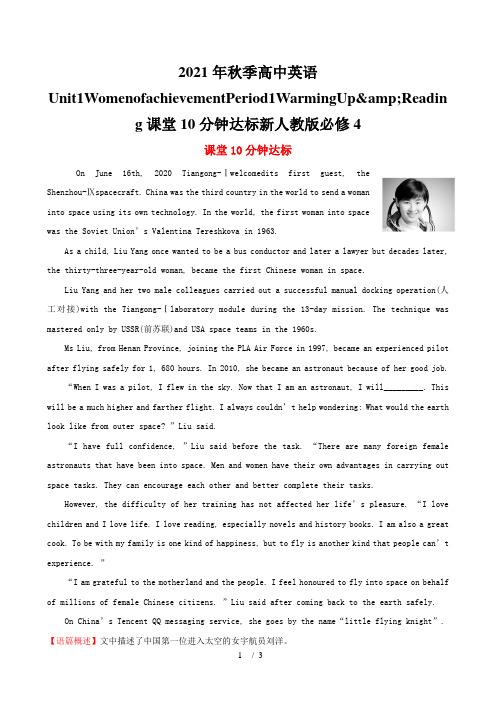
2021年秋季高中英语Unit1WomenofachievementPeriod1WarmingUp&Readin g课堂10分钟达标新人教版必修4课堂10分钟达标On June 16th, 2020 Tiangong-Ⅰwelcomedits first guest, theShenzhou-Ⅸspacecraft. China was the third country in the world to send a womaninto space using its own technology. In the world, the first woman into spacewas the Soviet Union’s Valentina Tereshkova in 1963.As a child, Liu Yang once wanted to be a bus conductor and later a lawyer but decades later, the thirty-three-year-old woman, became the first Chinese woman in space.Liu Yang and her two male colleagues carried out a successful manual docking operation(人工对接)with the Tiangong-Ⅰlaboratory module during the 13-day mission. The technique was mastered only by USSR(前苏联)and USA space teams in the 1960s.Ms Liu, from Henan Province, joining the PLA Air Force in 1997, became an experienced pilot after flying safely for 1, 680 hours. In 2010, she became an astronaut because of her good job.“When I was a pilot, I flew in the sky. Now that I am an astronaut, I wil l_________. This will be a much higher and farther flight. I always couldn’t help wondering: What would the earth look like from outer space? ”Liu said.“I have full confidence, ”Liu said before the task. “There are many foreign female astronauts that have been into space. Men and women have their own advantages in carrying out space tasks. They can encourage each other and better complete their tasks.However, the difficulty of her training has not affected her life’s pleasure. “I love children and I love life. I love reading, especially novels and history books. I am also a great cook. To be with my family is one kind of happiness, but to fly is another kind that people can’t experience. ”“I am grateful to the motherland and the people. I feel honoured to fly into space on behalf of millions of female Chinese citizens. ”Liu said after coming back to the earth safely.On China’s Tencent QQ messaging service, she goes by the name“little flying knight”. 【语篇概述】文中描述了中国第一位进入太空的女宇航员刘洋。
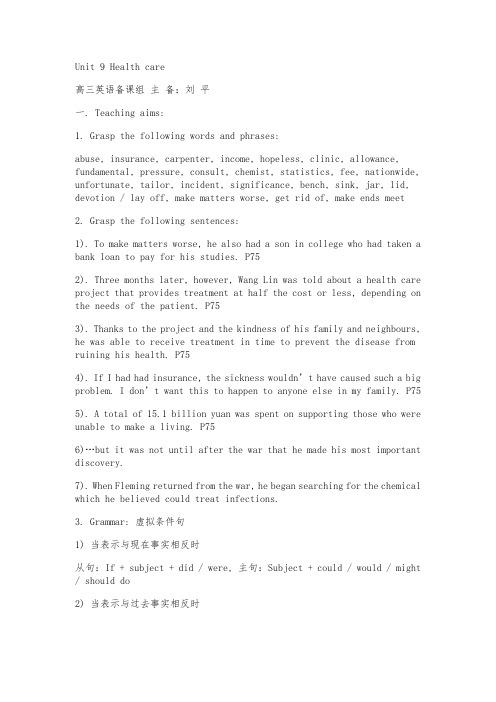
Unit 9 Health care高三英语备课组主备:刘平一. Teaching aims:1. Grasp the following words and phrases:abuse, insurance, carpenter, income, hopeless, clinic, allowance, fundamental, pressure, consult, chemist, statistics, fee, nationwide, unfortunate, tailor, incident, significance, bench, sink, jar, lid, devotion / lay off, make matters worse, get rid of, make ends meet2. Grasp the following sentences:1). To make matters worse, he also had a son in college who had taken a bank loan to pay for his studies. P752). Three months later, however, Wang Lin was told about a health care project that provides treatment at half the cost or less, depending on the needs of the patient. P753). Thanks to the project and the kindness of his family and neighbours, he was able to receive treatment in time to prevent the disease from ruining his health. P754). If I had had insurance, the sickness wouldn’t have caused such a big problem. I don’t want this to happen to anyone else in my family. P755). A total of 15.1 billion yuan was spent on supporting those who were unable to make a living. P756)…but it was not until after the war that he made his most important discovery.7). When Fleming returned from the war, he began searching for the chemical which he believed could treat infections.3. Grammar: 虚拟条件句1) 当表示与现在事实相反时从句:If + subject + did / were, 主句:Subject + could / would / might / should do2) 当表示与过去事实相反时从句:If + subject +had done, 主句:Subject + could/would/might/should have done3) 当表示与将来事实相反时从句:If + subject +did / should / were to, 主句:Subject + could / would / might / should do二.Teaching procedure: 4 periodsPeriod I Word Study1. abuse n.& vt. 滥用,虐待,辱骂(1)[U]对某物(某人)的滥用、妄用或虐待drug abuse滥用麻醉药品 child abuse虐待儿童abuse of trust/privilege 辜负别人得到的信任/滥用职权(2)[C]不正当的习俗,恶习,弊端put an end to abuses 废止不正当的习俗(3)vt. 滥用,妄用,误用Don’t abuse your authority.不要滥用你的权威。
Unit 9 Health careBy Zhu Xia Teaching goals:1. Get the students to master the important words and phrases in this unit.2. Improve the students'reading ability by teaching the texts.3. Practise expressing opinions4. Write an article for a journalTeaching important and difficult points: lay off, to make matters worse, aim at, consult, fee, purchase, care for, be serious about, clean up, at a/the cost, make ends meet, vow Teaching aids : a tape recorder , a computer ,Teaching periods5:periodsPeriods 1-2 Words and expressions Teaching aims and demands:1. Teach the new words to the students.2. Help the students master the usage of the words. Teaching important and difficult points: Help the students master the usage of the words. Teaching procedures: Step 1. Greetings Greet the whole class as usual Step 2. Read1. Teach the Ss to read the new words.2. Read the new words again and again .Step 3.Explanation 见教学案一体化讲义Step 4. Homework1. Learn them by heart.2. Finish off the exercises on the papers.Period 3. Reading A HELPING HAND Teaching aims and demands:Read about health careTeaching important and difficult points:Help the Ss to improve SSreadi ng comprehe nsionTeaching steps:Step 1 RevisionRevise what we have lear ned in the last less onStep 2 Lead-inSay :Today we are going to lear n about health care in China . Do you know anything about Sir Alexa nder Flemi ng /Er nst B. Cha in /Sir Howard Florey?Step 3 Fast reading1. Read the text quickly and do Tor F questions on the papers.2. Listen to the tape and do reading comprehension on the papers.Step 4 Careful readingRead the passage and fill in the blanks with one to three words.Keys:1. medical treatment 2. consult 3.purchase/buy 4. a healthy diet 5. purchase medical in sura nee. 6. give n by the gover nment 7. half the cost 8. health care model 9. purchase medical in sura nee 10. tests and treatme ntStep 5. Homework1. Read the passage aga in and aga in .2. Finish off the exercise.Period 4・Language pointsTeaching aims and demands:Master the usage of the importa nt vocabularly and senten ces.Teaching procedures:Step 1. RevisionReview what they have lear ned in the last less on.Step 2. ExplanationThe First Paragraph:1. a laid-off workerLay off him! Can't you see he's badly hurt? (不再做打扰人、讨人厌等的事, 不理会)You must lay off alcohol for a while.不再做或有害的事物)They were laid off because of the lack of new orders. lay off (解雇;下岗).2. to make matters worse: worse still, what 'worse, eve n worse 更虚糟糕的是(可作插入语),使事情更糟To make things worse, he had no money with him.3. take a bank loanThe Second Paragraph:4. An alyze the sentence If I had had in sura nee, ....... .•.•else in my family.” 可结合P78语法练习题1讲解)5. at a/the cost of 以 ... 代价I had a small room at a cost of fifteen cents per night.The war was won at a great cost.We are determined to get our rights at all costs.The Third Paragraph:6. aim atHe aimed (his gun)at the target, fired and missed it.瞄准、对准)She is aiming at a scholarship.(向某方向努力、力争)My remarks were not aimed at you.(评论、批评等针对某人)We must aim at increasing/to increase exports(. 意欲、企图、力求做某事)The Fifth Paragraph:7. be forced into poverty , fall into poverty, in poverty8. hospital fees fee n.1. )(付给律师、医生等的)酬金,服务费[C]I\'m afraid I can\'t afford the doctor\'s fee. 恐怕我付不起给医生的酬金。
Unit 1 Women of achievement(授日期:年月日礼拜班)授目Unit 1 Women of achievement第明确目 1 、知与技术:Enable the students to master some important words andexpressions.2、程与方法:Enable the students to master the new words and expressionsby practising and correcting.3、感情度与价:Develop the students' sense of individual learning.重点点要点:The usage of the new words and expressions in practice.点:How to memorize and use the new words and expressions?型□ 授□ □复□ □其他教学内容生活Step 1. Read aloudGet the students to read the words and expressions aloud.Step 2. Useful words ad expressions1.set off for2.mean doing sth/mean to do sth/meaning/meaningful/meaningless3.live a ⋯ life4.look down upon5.refer to6.It happens that/sb happens to do sthe across/come true/come out/come about8.att ract sb/attraction/attractive9. meet the nee ds of10.key to ⋯11.not only ⋯ but also12. affect/have an effec t onStep 3. Pra ctice on words and expressionsKeys: 1. achieve 2. res pect 3. crowded 4. observed 5. entertainment6. deliverStep 4. Homewo rkAsk the students to memorize the words and expressions after class.因材施教:讲课后记:。